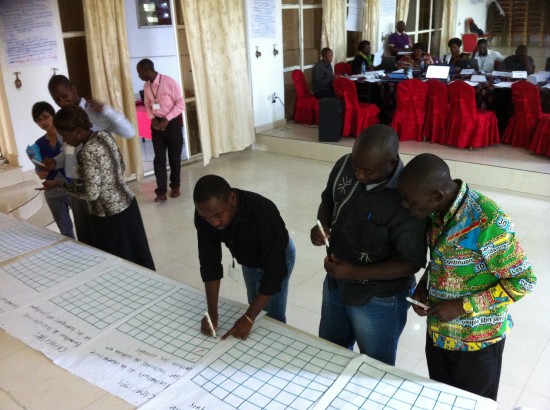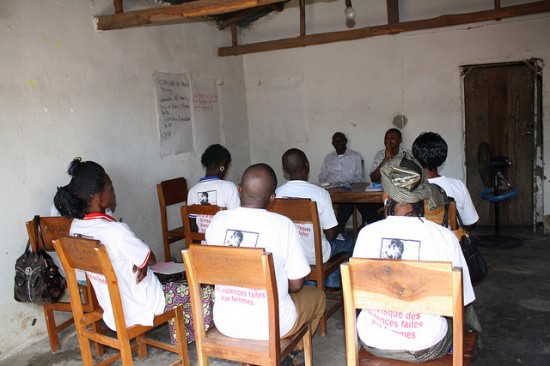 A Stimson Center workshop for civil society organisations in Goma, DRC. Image Credit: Stimson Center
A Stimson Center workshop for civil society organisations in Goma, DRC. Image Credit: Stimson CenterSince 2012, the Stimson Center has explored how UN peacekeeping operations can engage with conflict-affected communities, safely and effectively to develop strategies to protect civilians from deliberate violence. If UN peacekeeping operations don’t have the ability to engage directly with conflict-affected communities or their engagement would create a risk to the community, we recommend that they work with civil society organisations that have long-standing relationships with communities and understand the context better than external actors.
In May 2014, the project held workshops for civil society organisations in the eastern provinces of the DR Congo in partnership with a Congolese NGO. All the participants at the workshops were members of local- or national-level civil society organisations who worked with conflict-affected communities on a regular basis, and used information gathered from those communities to advocate to DR Congo government and the international community. Part of the workshops focused on the risks involved in collecting information from conflict-affected communities.
The workshop participants had plenty of experience to draw on when it came to the risks of working with communities. The dangers faced by civil society workers in DR Congo can be considerable, and several participants shared stories of being personally threatened, attacked or arrested as a result of their work. However, many of the civil society organisations had not received training to develop strategies to mitigate risks to the communities that their work might inadvertently create.
The workshops offered an opportunity for participants to collectively brainstorm ideas for managing risks to communities. The following strategies are straightforward, but demonstrate the importance of creating space for risk assessment and planning.
In a country like DR Congo where violence often has an ethnic component to it, inadvertently provoking these tensions is a major risk. Some participants talked about the potential dangers of conducting focus group research in communities where different ethnic groups feel hostile or distrustful toward one another. For example, it is important for members of a focus group to feel comfortable speaking openly in front of each other; in an ethnically divided community that might mean that members of different ethnic groups shouldn’t participate in he same focus group. On the other hand, participants warned that openly dividing people into different groups on the basis of ethnicity could prompt suspicions about the real motivation for the research and aggression between people of different ethnicities.
Another significant danger is the risk of reprisal attacks against the community for participating in the research. In an environment like DR Congo where dozens of armed groups operate and where state security forces can be just as predatory as non-state actors, information about who participated in the research and what information they gave can easily fall into the hands of perpetrators.
 Human rights training for SOS FED field workers in DR Congo. Image credit: The Advocacy Project
Human rights training for SOS FED field workers in DR Congo. Image credit: The Advocacy ProjectAgain, relying on a local partner can be critical to avoid recruiting members of groups that perpetrate threats or their affiliates. Researchers can also use other methods, like avoiding recording identifying details of research participants, using codenames to refer to specific perpetrators, ensuring that outsiders do not have the opportunity to observe the research participants or overhear the conversation, and storing the collected data securely, to mitigate this risk. Researchers should also think carefully about the potential impact that publishing specific pieces of information could have for the communities – if necessary, they should share the information privately with trusted protection actors instead of publicly.
Risk doesn’t have to come in the form of threats or violence. Simply participating in the research can be dangerous for some members of conflict-affected communities. Some individuals may have been traumatised by the violence they have experienced or witnessed, and asking them to participate in conversations about security threats in their community may trigger a traumatic reaction. Researchers should be trained to recognise the symptoms of trauma and to react appropriately in the moment, and they should be able to refer trauma-affected individuals to appropriate services where available. They should also make sure they have obtained their informed consent and avoid deliberately recruiting victims of traumatic violence as research participants unless they have appropriate skills or training to work with victims sensitively.
Finally, there is the risk of raised expectations, which can be hazardous if the community expects and plans for support that never arrives. Researchers should make sure that they have clearly explained the purpose of their research and what they hope will result from the research to participants before recruiting them, and return to communities after the research to share the results and how the information was used.
For organisations who want to make sure that their programs and interventions are responsive to the communities with which they are working, conducting research to understand the communities’ needs and perceptions is a vital first step. Relying on trusted members of the community who understand the complex dynamics, triggers and effects of conflict in the community and working with them to develop mitigation strategies, can help us to become more responsible researchers.
Aditi Gorur is a research associate at the Stimson Center. Visit Stimson’s Civilians in Conflict project page.










